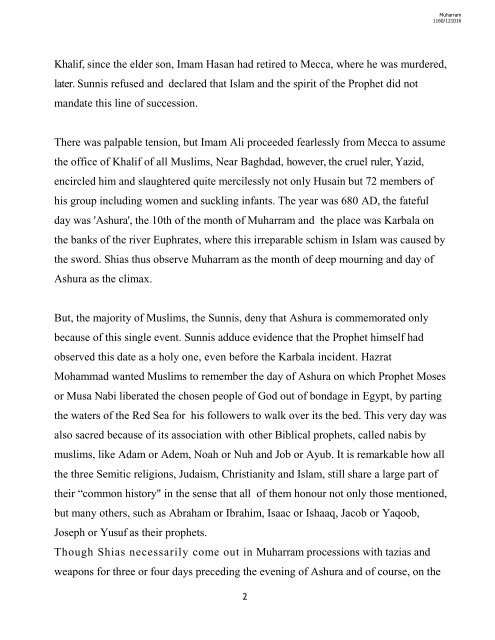MUHARRAM
Muharram_forbidden_first_month_of_the_Islamic_calendar_Jawhar_sircar
Muharram_forbidden_first_month_of_the_Islamic_calendar_Jawhar_sircar
You also want an ePaper? Increase the reach of your titles
YUMPU automatically turns print PDFs into web optimized ePapers that Google loves.
Muharram<br />
1160/121016<br />
Khalif, since the elder son, Imam Hasan had retired to Mecca, where he was murdered,<br />
later. Sunnis refused and declared that Islam and the spirit of the Prophet did not<br />
mandate this line of succession.<br />
There was palpable tension, but Imam Ali proceeded fearlessly from Mecca to assume<br />
the office of Khalif of all Muslims, Near Baghdad, however, the cruel ruler, Yazid,<br />
encircled him and slaughtered quite mercilessly not only Husain but 72 members of<br />
his group including women and suckling infants. The year was 680 AD, the fateful<br />
day was 'Ashura', the 10th of the month of Muharram and the place was Karbala on<br />
the banks of the river Euphrates, where this irreparable schism in Islam was caused by<br />
the sword. Shias thus observe Muharram as the month of deep mourning and day of<br />
Ashura as the climax.<br />
But, the majority of Muslims, the Sunnis, deny that Ashura is commemorated only<br />
because of this single event. Sunnis adduce evidence that the Prophet himself had<br />
observed this date as a holy one, even before the Karbala incident. Hazrat<br />
Mohammad wanted Muslims to remember the day of Ashura on which Prophet Moses<br />
or Musa Nabi liberated the chosen people of God out of bondage in Egypt, by parting<br />
the waters of the Red Sea for his followers to walk over its the bed. This very day was<br />
also sacred because of its association with other Biblical prophets, called nabis by<br />
muslims, like Adam or Adem, Noah or Nuh and Job or Ayub. It is remarkable how all<br />
the three Semitic religions, Judaism, Christianity and Islam, still share a large part of<br />
their “common history" in the sense that all of them honour not only those mentioned,<br />
but many others, such as Abraham or Ibrahim, Isaac or Ishaaq, Jacob or Yaqoob,<br />
Joseph or Yusuf as their prophets.<br />
Though Shias necessarily come out in Muharram processions with tazias and<br />
weapons for three or four days preceding the evening of Ashura and of course, on the<br />
2


